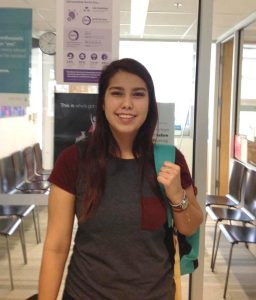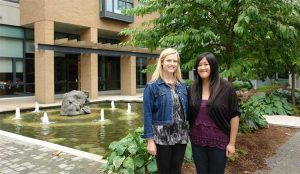ASA Student Spotlight: Siera Stonechild
Siera Stonechild is a 2nd year student in the Honours History major in the Bachelor of Arts. She is Plains Cree from Red Deer Alberta, and offers plenty of insight into the transition to, and life of, an Aboriginal student at UBC. Keep reading to learn more about her academics, her transition to the west coast, […]
Meet Jordan Wilson: Bringing research back to the community
FNSP offers a research practicum in which students partner with a community and do research based on the community’s needs. Jordan worked with the Museum of Anthropology and his band, Musqueam, to research unpublished material housed in the Museum of Anthropology for the Musqueam Indian Band archives. For his research, Jordan interviewed anthropologist and UBC Professor Emeriti Michael Kew and as a result created a catalogue for Kew’s 1981 exhibit “Visions of Power, Symbols of Wealth.”
Meet Helen Bell: Looking to the past
Helen Bell came to UBC to pursue a bachelor’s degree, but will be walking away with much more than a piece of paper: learning to conduct research has opened the door to a wealth of knowledge — and her own identity. “The research component at this institution is excellent,” says Bell. “The respect, integrity and recognition of the uniqueness of First Nations people has really stood out for me. It’s crucial for me that we’re doing research for and with First Nations people, not studying them like specimens under a [magnifying] glass.”
Meet Jessica McIntyre: Lights, camera, beaver meat!
Jessica McIntyre is a student who completed a summer co-op placement with the Aboriginal Peoples Television Network (APTN) which took her to the Northwest Territories. McIntyre, a member of the Northwest B.C. coast Musgamaug Tsawataineuk First Nation, is one of a growing number of students at UBC choosing to extend their studies by a year for the chance to gain valuable work experience through co-op placements.
Meet Stephanie Charlie: Pursuing education to serve
When her first nation signs its first-ever treaty, Stephanie Charlie wants to be there. “I want to help my community,” says Charlie, a graduating UBC Arts student and member of Cowichan Tribes, one of Canada’s largest First Nation communities, located in Duncan on Vancouver Island. “That is why I plan to run for councilor in our next election.
Meet Karrmen Crey and Amy Perreault: Creating change through storytelling
As a directed studies project in the First Nations Studies Program, Karrmen Crey and Amy Perreault recently completed What I Learned in Class Today, a film documenting the responses of nine students to intentional and unintentional occurrences of racism.
Karrmen Crey and Amy Perreault say their video project began as a vent session in a course they were taking with First Nations Studies Professor Linc Kesler.
“We would start the class by telling stories about classes we were in,” relates Crey, a recent graduate of the program.
The stories, she adds, were a way of dealing with some of the offensive and ignorant statements they had heard about Aboriginal people — not on the street, but right in their classes at UBC.
“They were kind of funny, they were, of course, kind of absurd,” Crey says of the remarks of some UBC students and professors.
The statements were profoundly hurtful, often for no other reason than the fact that non-Aboriginal students sometimes forget that in talking about the historic challenges faced by Canada’s First Nations, they are talking about issues that Aboriginal students among them have experienced themselves.
Noting a pattern, Kesler observed that it would be a good idea to gather the stories of Aboriginal and non-Aboriginal students alike.
That suggestion lit a fire under Crey and Perreault — both senior undergraduate students at the time. They were highly interested in developing a resource that would help fellow students and faculty discuss sensitive inter-cultural issues without hurting, or alienating people.
As a directed studies project in the First Nations Studies Program, Crey and Perreault recently completed What I Learned in Class Today.
Video, they discovered, was a perfect medium, especially for getting uncomfortable first-person experiences out in the open.
They’ve screened a preliminary version of the video at several forums, including UBC’s Realities of Race conference in March 2007. In each case, audience members have been struck by the honesty of the students, who express their stories in their own words.
“You read a report, you can look at statistics, but actually being faced with students at UBC right now who are experiencing these things is pretty powerful.”
Dara Kelly is one Aboriginal student interviewed in the film. A member of the Fraser Valley Le’qa:mel First Nation, Kelly was in an English class with a focus on Aboriginal authors last year when one student prefaced a group discussion by asking why Aboriginal people were so “screwed up.”
For Kelly, that comment felt like a slap in the face, and in the film she candidly discusses why she finds the remark totally unacceptable.
“At the same time, when that kind of incident happens, it’s almost so shocking, or unbelievable, or hurtful that nobody says anything, and nobody knows what to do,” she says.
That’s one of the reasons Crey and Perreault created the video in the first place — the aim is to talk about these discussions, and to acknowledge that these aren’t just difficult for Aboriginal students.
People may recognize that something is racist, or insensitive, but not know what to do, or say, underscore Crey and Perreault.
Crey and Perreault say they intend to widen the scope of the project and add more interviews, as well as related classroom material, to accompany the film.
With the broad goal of removing an institutional barrier to Aboriginal post-secondary education, they plan on crafting their project to make it a resource for teachers at UBC and other institutions, something relevant to larger, multi-ethnic audiences.
“This video is here and it’s available,” Perreault says, “so let’s start talking about it instead of not talking about it, or talking about it in the hallway after class.”
———
By Bryan Zandberg (BA, 2006, in French and Spanish). Bryan is a former editor with The Ubyssey.


